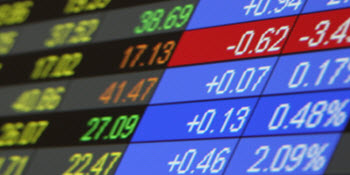Stock markets are financial markets. They exist to provide a means of trading for equity securities. Each security represent units of ownership in a business.
A stock exchange is a place where investment dealers act on behalf of clients to find buyers for clients’ securities. A stock exchange does not set prices for securities, however, the stock exchange set rules governing the trading of equity securities.
Companies must apply to list their shares for trading on an exchange. Each Exchange has regulation than qualify whether the company’s shares will be accepted for listing. If the company is listed, it must abide by the rules of the exchange. Companies receive a number of benefit from listing on the Stock Exchange. The most important is that marketability of the shares is increased.
Stock Overview.
 Securities can be divided into two basic groups:
Securities can be divided into two basic groups:
- Stocks (shares) – represent a degree of ownership.
- Bonds – represent debt obligation of the issuers of the bonds.
There are two main type of stocks:
- Common shares
- Preferred shares
“Stock Certificates” are the paper representation of en equity ownership interest in an incorporated company.
- Private Corporation – the stock is usually owned by a small group of person and is not traded with members of the public.
- Public Corporation – the stock is usually available for sale to the general public, via a stock exchange or the over-counter-market.
All corporations are authorized to issue stock (shares) and may be also authorized to issue debt-type securities, such as bond.
Authorized stock (capital stock) is the maximum number of shares the corporation may issue or sell. Any authorized stock that was not sold is commonly referred to as unused stock, or treasury stock. Issued stock is authorized stock that has been sold to an individual person or other corporation. Individuals who buy shares of stock are known as shareholders.
Over-the-counter Markets (OTC Markets).

The shares of publicly traded companies that are not listed on a stock exchange may still be traded on an OTC market. An over-the-counter stock market is a network of brokers and dealers that trade stocks and bonds that are not listed on an Exchange. Sometimes companies prefer to be listed on an OTC market instead of listing on a stock exchange. There are some of the reasons why:
- unwillingness to abide by the information disclosure rules of an exchange
- low volume of share trading
- low investor interest
- inability to meet the listing requirements of an exchange
The OTC market ha s role to play in the primary market. Many new stock issues are sold over-the-counter initially. Large block of outstanding shares offered for a sale by a single investor, whether listed on an exchange or not, are sometimes sold in the OTC stock market.
The disclosure standards for the OTC market are not as stringent as those imposed by a stock exchange. Corporation whose shares are listed on an exchange are generally not allowed to list or trade on the OTC market and vise versa.